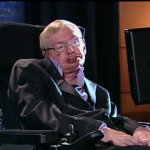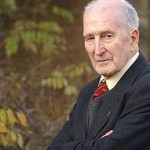Why Must There Be at Least One Unconditioned Reality?
by Karlo Broussard
Filed under The Existence of God
NOTE: Today we kick off a six-part series by Karlo Broussard on a metaphysical proof for God's existence. The posts will run each of the next six Mondays.
- Part 1 - Why Must There Be at Least One Unconditioned Reality?
- Part 2 - The Absolute Simplicity of Unconditioned Reality
- Part 3 - The Absolute Uniqueness of Unconditioned Reality
- Part 4 - The Key Divine Attributes of the Absolutely Unique and Simple Unconditioned Reality
- Part 5 - Key Attributes: Perfection the Three Omnis
- Part 6 - Important Features of the Metaphysical Proof
There seems to be a pervasive view today that atheism has the intellectual high ground relative to theism. Atheist often perceive acknowledgment of God’s existence as being naïve or intellectually shallow. The basis for this perception is the common belief that all arguments theists propose for the existence of God are “god of the gaps” arguments (arguments where the theist posits God to fill in the gap created by a lack of natural explanations for a certain phenomenon). Such thinking leads atheists to define the believer’s acceptance of God as belief without evidence—a sort of blind impulse of the mind, which is appalling and repulsive for an intellectually responsible individual.
The problem is that such “god of the gaps” arguments are not representative of traditional or classical theism as embodied in the Catholic Tradition. Many classical philosophers would agree with atheists in rejecting such "god of the gaps" arguments and view them as unworthy of being classified as an argument for God’s existence. The arguments used by classical theists arrive at what is traditionally defined as "God" by logical necessity, not probability. God is seen as that which is metaphysically necessary to coherently and intelligibly account for the very existence of things within the universe and the universe as a whole.
For this reason, I am going to offer over the course of several posts a metaphysical argument for God’s existence. For the first and second installments, I will be drawing heavily from Fr. Robert Spitzer’s award winning book, New Proofs for the Existence of God: Contributions of Contemporary Physics and Philosophy. Installment one will consist of an argument for why there must exist at least one unconditioned reality in all of reality (i.e., a reality that does not depend on conditions being fulfilled in order to exist but exists in and through itself). The second installment will involve a demonstration of why unconditioned reality considered in and of itself must be absolutely simple in the metaphysical sense (that is to say pure being or pure existence itself). In installment three, I will argue that there can be one and only one unconditioned reality. Installments four and five will explain how one can deduce the various divine attributes for the one unconditioned reality that have been classically ascribed to God. Finally, in installment six, I will offer a few thoughts on why such a metaphysical demonstration is so important in the modern debate between atheism and theism with an eye on some common objections from atheists.
So, let’s start with why there must be at least one unconditioned reality.
We may start by elucidating the whole range of possibilities for all of reality by establishing what philosophers call a complete disjunction. In all of reality there is either at least one unconditioned reality (a reality that does not need any conditions fulfilled in order to exist but exists by its very nature—a reality that exists in and through itself) or no unconditioned reality, in which case all existing things in reality would be conditioned realities (a reality that needs conditions fulfilled in order to exist). For the sake of brevity, we’ll follow the lead of Fr. Spitzer and call the first side of the disjunction Hypothesis UR (at least one unconditioned reality in all of reality) and the other side of the disjunction Hypothesis ~UR (no unconditioned reality in all of reality).
Now, because these hypotheses exhaust the entire range of possibilities in all of reality, one has to be true and the other has to be false. They cannot both be true and they cannot both be false. So, if we can prove that Hypothesis ~UR is false, then we will have simultaneously proven that Hypothesis UR is true. It is my intention to argue as such in this post.
In order to make our navigation through the argument easier, it is necessary that we formulate another complete disjunction for Hypothesis ~UR. If there is no unconditioned reality in all of reality (Hypothesis ~UR), then a conditioned reality (e.g., a cat) is either going to depend upon a finite number of conditions where every condition is a conditioned reality (Hypothesis F) or an infinite number of conditions where every condition is a conditioned reality (Hypothesis ~F).
The thrust of the argument for this part of the demonstration is to show that neither Hypothesis F nor Hypothesis ~F can be true. Since Hypothesis F and Hypothesis ~F elucidate all the possibilities for reality under Hypothesis ~UR, if Hypothesis F and Hypothesis ~F can be proven false, then Hypothesis ~UR must be false as well—which, again, will prove that Hypothesis UR is necessarily true.
Let’s begin by showing the falsity of Hypothesis F, that a conditioned reality (e.g., a cat) is dependent upon a finite number of conditions where every condition is itself a conditioned reality.
First, if the cat is dependent upon a finite number of conditions, then that means there is going to be a most fundamental condition (a last or terminating condition) in the series of conditions that the cat depends upon for its existence right here and right now. For example, the cat is dependent upon the existence of its cells, which in turn are dependent upon amino acids and proteins, the amino acids and proteins depend on the existence of molecules, the molecules depend upon atoms, the atoms depend upon protons, the protons depend upon quarks, and so forth. With such a series, the quark (or something more fundamental) would be the terminating condition that the cat depends upon for its existence right here and right now.
Since Hypothesis ~UR asserts that there are no unconditioned realities in all of reality and only conditioned realities exist, this most fundamental or “last” condition in the series would have to be a conditioned reality, which means it must have its conditions fulfilled in order to exist. But in such a case this conditioned reality could not have its conditions fulfilled since it is the last or most fundamental condition (remember Hypothesis ~UR doesn’t allow for any unconditioned realities).
Now, if this most fundamental condition of the cat is a conditioned reality whose conditions cannot be fulfilled, then it would be non-existent (nothing) and consequently every other conditioned reality dependent on it would be nonexistent as well, including the cat. But the cat does exist. Therefore, the cat cannot be dependent upon a finite number of conditions where every condition is itself a conditioned reality. Hypothesis F is thus false.
What about Hypothesis ~F? Could the cat be dependent upon an infinite number of conditions where every condition is a conditioned reality? There are two lines of reason that lead us to answer this question in the negative.
The first approach takes into consideration the insufficiency of conditioned realities in accounting for the existence of other conditioned realities. Consider for example the cells that the cat is dependent upon for its existence. Upon reflection we notice that the cells have no power in and of themselves to be an existing condition for the cat (i.e., they are not self-sufficient). These cells, in order to exist right here and right now, depend on the existence of amino acids and proteins. In light of this, we may ask, “Are the cells sufficient to account for the cat existing right here and right now?” Obviously the answer is no because we must appeal to the existence of the amino acids and proteins.
The same applies to the amino acids and proteins. They do not have any power in and of themselves to be existing conditions for the cat because they in turn depend, right here and now, on the existence of molecules. As we did for the cells, we may ask, “Are the amino acids and proteins sufficient to account for the cat existing right here and now?” Obviously the answer is no because we must appeal to the existence of molecules.
Now, the molecules have the same existential quality as do the cells and the amino acids and proteins. They are insufficient to account for the existence of the cat because they in turn are conditioned realities depending right here and right now on the existence of atoms. But the atoms in turn are dependent on the existence of protons. This makes the atoms conditioned realties as well and thus insufficient (like the molecules, like the proteins, like the cells) to account for the cat existing right here and right now.
Notice what we have here so far. Any condition of the cat that is in turn a conditioned reality is insufficient to account for the cat existing right here and right now—every one of them “passes the buck” in the search for a sufficient grounding of the cat’s existence.
So, the question now becomes, “Can one arrive at a sufficient explanation for the cat’s existence by postulating an infinite number of insufficient conditions?” (Hypothesis ~F). The answer is no.
The key lies in the fact that the insufficiency of the conditions in the series is not quantitative in nature but qualitative. If the insufficiency was quantitative in nature then the addition of insufficiencies might make a sufficiency (e.g., twenty horses could pull what two could not). But the insufficiency in the series is not quantitative in nature but qualitative. It is more akin to stupidity or blindness. As Bishop Fulton Sheen once wrote, “Ten thousand idiots never make a wise man...one hundred blind men do not make a blind man see.”1 As such, the addition of insufficiencies does not make sufficiency. Therefore, one cannot get a sufficient explanation for the cat’s existence by postulating an infinite number of insufficient conditions.
Now, if one cannot get a sufficient explanation of the cat’s existence by postulating an infinite number of insufficient conditions, then Hypothesis ~F is tantamount to saying that every condition the cat is dependent upon is insufficient to account for the cat existing right here and right now. But if there are no conditions that are sufficient to account for the cat existing right here and right now (no sufficient grounding of the cat’s existence), then the cat would not currently exist. But the cat does currently exist. Therefore, like Hypothesis F, Hypothesis ~F must be false.
The second line of reasoning for disproving Hypothesis ~F shows that if the series of conditioned realities regresses ad infinitum without an unconditioned reality the series itself would be equivalent to nothing. Take for example, as we did before, the cells that the cat is dependent upon. The cells cannot be existing conditions for the cat without the existence of amino acids and proteins. But amino acids and proteins cannot exist as conditions for the cell unless molecules exist. Similarly, molecules cannot be existing conditions for the amino acids and proteins unless atoms exist and the atoms cannot exist as fulfilled conditions for molecules unless protons exist.
Now, if the series regresses infinitely to more and more fundamental conditions that have the same existential status as the aforementioned conditions, then the search for the fulfillment of conditions would go on endlessly. But if the search for the fulfillment of conditions would go on endlessly, then every hypothetical conditioned reality in the series would never have its conditions fulfilled and thus would never come into existence. No matter where we’re at in the series we’ll always come to a conditioned reality that is nonexistent because it is existentially dependent upon other nonexistent conditioned realities. As Fr. Robert Spitzer writes,
"Since every hypothetical conditioned reality is dependent upon other nonexistent conditioned realities for its existence, it will never come into existence. It does not matter whether one posits an infinite number of them; for each one in the series of dependence is still equal to nothing without the reality of the others. But if the “others” are nothing without others, and those “others” are nothing without still others, it does not matter if one postulates an infinite number of others (or arranges the infinite number of others in a circle). They are all still nothing in their dependence upon nonexistent conditions."2
Therefore, an infinite series of conditions where every condition is a conditioned reality is equivalent to a series of nonexistent conditions because no conditioned reality could ever have its conditions fulfilled.
Now we come back to our original question that constitutes Hypothesis ~F: “Could the cat be dependent upon an infinite number of conditions where every condition is a conditioned reality?” In light of the previous reasoning, we have to answer in the negative. If the cat is dependent upon an infinite number of conditions where every condition is a conditioned reality, then the cat would be dependent upon a series of nonexistent conditions. But for the cat to depend upon a series of nonexistent conditions would mean that the cat would not exist. But the cat does exist. Therefore, the cat cannot be dependent upon an infinite number of conditions where each condition is itself a conditioned reality. In other words, Hypothesis ~F is false.
Now, recall that we initially elucidated all the possibilities for Hypothesis ~UR with Hypothesis F and Hypothesis ~F. As such, if Hypothesis F and Hypothesis ~F are false, then Hypothesis ~UR would be false. Hypothesis F and Hypothesis ~F are false (as demonstrated above). Therefore, Hypothesis ~UR must be false.
Furthermore, because we elucidated by way of a complete disjunctive syllogism the whole range of possibilities for all of reality with Hypothesis ~UR and Hypothesis UR, it follows that since Hypothesis ~UR is false, Hypothesis UR must be true—that is to say any conditioned reality (e.g., the cat) must ultimately have its conditions fulfilled by at least one unconditioned reality (a reality that does not depend upon the fulfillment of any conditions for its existence).
But is such a reality worthy of what theists have traditionally defined as God? In other words, is unconditioned reality pure being or pure existence itself? Can there be more than one unconditioned reality? Is such reality immutable, immaterial, eternal, perfect, personal, all-powerful, etc.? The answers to these questions will have to wait for the forthcoming posts.
Related Posts
Notes:
- Fulton J. Sheen, Philosophy of Religion: The Impact of Modern Knowledge on Religion (New York: Appleton-Century-Crofts, 1948), pg. 137.
- Robert Spitzer, New Proofs for the Existence of God: Contributions of Contemporary Physics and Philosophy (Grand Rapids: Eerdmans Publishing), pg. 116 [italics in the original].
Note: Our goal is to cultivate serious and respectful dialogue. While it's OK to disagree—even encouraged!—any snarky, offensive, or off-topic comments will be deleted. Before commenting please read the Commenting Rules and Tips. If you're having trouble commenting, read the Commenting Instructions.














